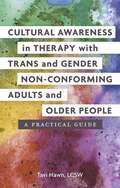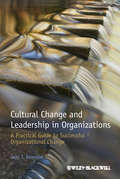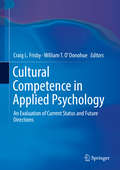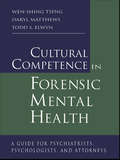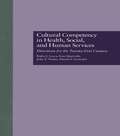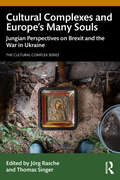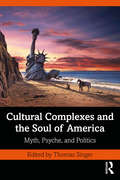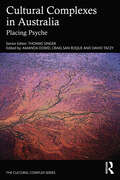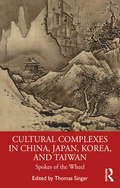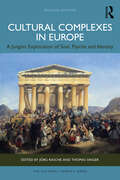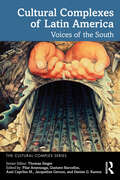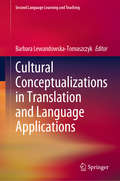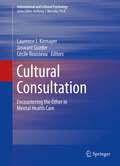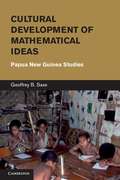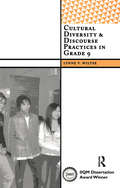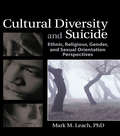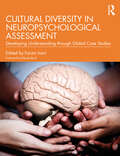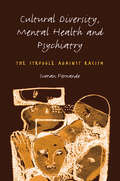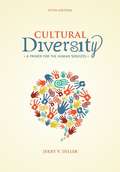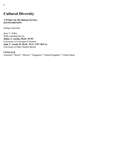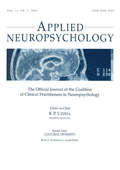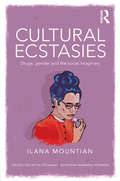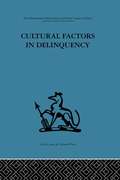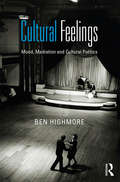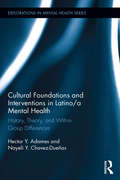- Table View
- List View
Cultural Awareness in Therapy with Trans and Gender Non-Conforming Adults and Older People: A Practical Guide
by Tavi HawnPractical advice for therapists and other professionals on developing culturally sensitive practices with trans clients regardless of race, ethnicity or religion, including older trans people. Includes case studies, tips, self-assessment checklists and further resources.
Cultural Change and Leadership in Organizations
by Jaap J. BoonstraCultural Change and Leadership in Organizations discusses ways in which organizations are able to implement successful strategic change; inspirational and conceptual material is combined with practical examples and concrete interventions for planning and implementing cultural change within organizations. Cultural Change and Leadership in Organizations is targeted toward professionals, including organizational psychologists, consultants, senior managers, and human resources professionals, as well as advanced-level business school courses.
Cultural Competence in Applied Psychology: An Evaluation of Current Status and Future Directions
by William T. O'Donohue Craig L. FrisbyThe first volume of its kind, this provocative book evaluates the construct of cultural competence from multiple perspectives. At the intersection of diverse disciplines and domains, contributors argue for greater clarity in understanding the cultural competence construct, a deeper level of analysis as to its multifaceted components, and call for concrete practical objectives and science-based means of measurement. Serious, nuanced discussion addresses challenges, strengths, and limitations of current cultural competence practice in terms of sociocultural concepts (e.g., race, ethnicity) and practical concepts (e.g., sensitivity in the therapeutic relationship, treatment efficacy). In addition, contributors identify future directions for research, training, and practice with the potential to spur the further evolution of this clinically important construct. This timely book: Critiques the cultural competence construct and its evaluation as it is currently disseminated within applied psychology. Compares and contrasts how cultural competence is defined within clinical, school, and counseling psychology. Analyzes difficulties and challenges in understanding the cultural competence construct as evaluated through the lens of closely related fields outside of applied psychology. Spotlights complexities in cultural competence issues pertaining to specific populations. Sets out implications for education and training, offering a detailed outline for an ideal college course in cultural competence With this level of reasoning and rigor, Cultural Competence in Applied Psychology is sure to stimulate long-overdue dialogue and debate among professionals across a wide variety of fields, such as clinical psychology, social work, child and social psychology, psychotherapy, school psychology, and counseling.
Cultural Competence in Forensic Mental Health: A Guide for Psychiatrists, Psychologists, and Attorneys
by Wen-Shing Tseng Daryl Matthews Todd S. ElwynAs culturally relevant psychiatry becomes common practice, the need for competent and culturally relevant forensic psychiatry comes to the forefront. This volume, written by one expert in cultural psychiatry and another in forensic psychiatry addresses that need. By combining their expertise in these areas, they are able to develop and create a new body of knowledge and experiences addressing the issue of the cultural aspects of forensic psychiatry. Beginning with an introduction to cultural and ethnic aspects of forensic psychiatry, this volume will address basic issues of the practice, as well as more detailed areas ranging from the various psychiatric disorders to intensive analysis and discussion of how to perform forensic psychiatric practice in a culturally relevant and competent way. Also the book suggests methods for continued awareness and sensitivity to issues of cultural and ethnic diversity in the field.
Cultural Competency in Health, Social & Human Services: Directions for the 21st Century (Social Psychology Reference Series)
by Pedro J. Lecca Ivan Quervalu Joao V. Nunes Hector F. GonzalesCultural competency is an issue that is becoming increasingly more important as thousands of people come to this country every year. Because of widely different social mores, living conditions, traditions, personal beliefs, and practices of clients, health professionals in all specialties are finding it difficult to communicate effectively with the members of the diverse racial and ethnic groups that come to them for help. To give health and human services professionals the necessary training, material on cultural competency has been mandated in several different curricula, yet appropriate pedagogical material remains relatively rare. This pioneering volume presents the latest information and techniques for improving cultural competency in the delivery of health, social, and human services to ethnic and racial minority groups in the United States. Special attention is paid to the importance of understanding the social and culture backgrounds of clients when assessing diagnosis of policy and economic issues, which are rarely examined in this context. Notable for its combination of theory and practice, which will be invaluable for both professionals and students, this book also includes material on cultural competency within such special populations as the mentally ill, the elderly, children, and families.
Cultural Complexes and Europe’s Many Souls: Jungian Perspectives on Brexit and the War in Ukraine (The Cultural Complex Series)
by Thomas Singer Jörg RascheThis timely and important new volume examines the impacts of Brexit and the war in Ukraine from the lens of the cultural complex model, in an exploration of the underlying dynamic relationships within and between countries.There have been seismic changes in Europe in recent years, with the onset of Brexit and the Russian–Ukraine war, pre-existing cultural complexes have erupted in fragmenting divisions and war, creating an atmosphere closest to that of the ominous animosities of the Cold War after World War 2 and impacting the psyche on both an archetypal and cultural level. In this volume, contributors provide early attempts to make sense of the current situation, and to think about it in terms of activated cultural complexes, specifically in Britain and Eastern Europe, and perhaps across the globe.This will be an important read for Jungian analysts interested in the underlying dynamic fuelling Brexit and the Ukraine–Russia war as well as those interested in Jungian studies, analysis and political activism, and international affairs from a Jungian perspective.
Cultural Complexes and the Soul of America: Myth, Psyche, and Politics
by Thomas SingerCultural Complexes and the Soul of America explores many of the cultural complexes that comprise the collective psychic-filtering system of emotions, ideas, and beliefs that possess the United States today. With chapters by an international selection of leading authors, the book covers ideas both broad and specific, and presents unique insight into the current state of the nation.The voices included in this volume amplify contemporary concerns, linking them to themes which have existed in the American psyche for decades while also looking to the future. Part One examines meta themes, including history, purity, dominion, and democracy in the age of Trump. Part Two looks at key complexes including race, gender, the environment, immigration, national character, and medicine. The overall message is that it is in wrestling with these complexes that the soul of America is forged or undone.This highly relevant book will be essential reading for academics and students of Jungian and post-Jungian ideas, politics, sociology, and American studies. It will also be of great interest to Jungian analysts in practice and in training, and anyone interested in the current state of the US.
Cultural Complexes in Australia: Placing Psyche (The Cultural Complex Series)
by Thomas Singer Craig San Roque David Tacey Dowd AmandaCultural Complexes in Australia: Placing Psyche is the first in a series of books that will explore the notion of cultural complexes in a variety of settings around the world. The continent of Australia is the focus of this inaugural volume in which the contributors elucidate how the unique geography and peoples of Australia interact and interpenetrate to create the particular "mindscapes" of the Australian psyche. While the cultural complexes of Australia are explored with a keen eye to the specificity of place, history, context, and content, at the same time it becomes obvious that these cultural complexes emerge out of an archetypal background that is not just Australian but global. This volume shows how cultural complex theory itself mediates between the particularity of place and the universality of archetypal patterns.
Cultural Complexes in China, Japan, Korea, and Taiwan: Spokes of the Wheel
by Thomas SingerThomas Singer presents a unique collection which examines cultural complexes in four parts of East Asia: China, Japan, Korea, and Taiwan. From ancestor worship in China to the "kimchi bitch" meme of South Korea, the wounded feminine in Taiwan and hikikomori in Japan, the contributors take a Jungian lens to aspects of culture and shine a light on themes including gender, archetypes, consciousness, social roles, and political relations. This insightful and timely book will be essential reading for academics and students of Jungian and post-Jungian ideas, politics, sociology, and Asian studies. It will also be of great interest to Jungian analysts in practice and in training.
Cultural Complexes in Europe: A Jungian Exploration of Soul, Psyche and Identity (The Cultural Complex Series)
by Thomas Singer Jörg RascheWhat is going on in Europe? The actual conflicts between its nations or states can be traced back to old and revived cultural complexes. In this book, first compiled in 2016, Jungian analysts explore the cultural identities of their European homelands and nations. This is a new approach to old questions: What makes a people feel at home? How do their traditions and narratives form a cultural Self and identity? How do they differ from one another? Exploring cultural complexes blends knowledge of history, economics, sociology, anthropology, geography, psychology, religious studies, literature, and poetry. But as every complex is built around an emotional core, the study of how cultural complexes live in the psyche is not limited to these disciplines. Each author and reader engages in a confrontation with their emotions, prejudices, and projections. The shape that the ideas and feelings of a cultural complex take in the psyche can be inchoate, rapidly shifting and yet paradoxically long standing, and often quite immune and impermeable to the reason that traditional disciplines of thought would impose on them. These cultural complexes do not necessarily provide a coherent or linear sequencing of facts and events because that is not how they actually exist and function in the psyche of individuals and groups. At the same time, cultural complexes shape what it means to be a citizen of a particular city, region, or country of Europe.This remarkable book is an important read for Jungian analysts and those interested in Europe’s historical and cultural development.
Cultural Complexes of Latin America: Voices of the South (The Cultural Complex Series)
by Thomas Singer Pilar Amezaga Gustavo Barcellos Áxel Capriles M Jacqueline Gerson Denise G. RamosCultural Complexes of Latin America: South and the Soul explores the theory and embodied reality that cultural complexes are powerful determinants in the attitudes, behaviour, and emotional life of individuals and groups. The contributing authors, all from several Latin American countries, present compelling historical, anthropological, sociological, mythological, psychological, and personal perspectives on a part of the world that is full of promise and despair. Latin America is a region marked with psychic "fault lines" that cause disturbances in its populations on issues of social class, ethnicity, race, religion, gender, and even geography. Many of these "fault lines" appear to have their origins in the "basic fault" that occured with the conquest and colonization of the region, primarily by the Spanish and Portuguese. This "basic fault" and its subsequent "fault lines" reside not only in various groups that compete for status, power, wealth, and meaning but in the psyche of every Latin American individual who carries the emotional memories and scars of conflicts that have coursed through their mixed blood for generations.
Cultural Conceptualizations in Translation and Language Applications (Second Language Learning and Teaching)
by Barbara Lewandowska-TomaszczykThe book comprises a selection of 14 papers concerning the general theme of cultural conceptualizations in communication and translation, as well as in various applications of language.Ten papers in first part Translation and Culture cover the topics of a cognitive approach to conceptualizations of Source Language – versus Target Language – texts in translation, derived from general language, media texts, and literature.The second part Applied Cultural Models comprises four papers discussing cultural conceptualizations of language in the educational context, particularly of Foreign Language Teaching, in online communication and communication in deaf communities.
Cultural Consultation: Encountering the Other in Mental Health Care (International and Cultural Psychology)
by Laurence J. Kirmayer Jaswant Guzder Cécile RousseauBased on a recently completed project of cultural consultation in Montreal, Cultural Consultation presents a model of multicultural and applicable health care. This model used clinicians and consultants to provide in-depth assessment, treatment planning, and limited interventions in consultation with frontline primary care and mental health practitioners working with immigrants, refugees, and members of indigenous and ethnocultural communities. Evaluation of the service has demonstrated that focused interventions by consultants familiar with patients' cultural backgrounds could improve the relationship between the patient and the primary clinician. This volume presents models for intercultural work in psychiatry and psychology in primary care, general hospital and specialty mental health settings. The editors highlight crucial topics such as: - Discussing the social context of intercultural mental health care, conceptual models of the role of culture in psychopathology and healing, and the development of a cultural consultation service and a specialized cultural psychiatric service - Examining the process of intercultural work more closely with particular emphasis oto strategies of consultation, the identity of the clinician, the ways in which gender and culture position the clinician, and and interaction of the consultant with family systems and larger institutions - Highlighting special situations that may place specific demands on the clinician: working with refugees and survivors of torture or political violence, with separated families, and with patients with psychotic episodes This book is of valuable use to mental health practitioners who are working in multidisciplinary settings who seek to understand cultural difference in complex cases. Psychiatrists, psychologists, social workers, nurse practitioners, primary care providers and trainees in these disciplines will make thorough use of the material covered in this text.
Cultural Development of Mathematical Ideas
by Geoffrey B. Saxe Indigo EsmondeDrawing upon field studies conducted in 1978, 1980, and 2001 with the Oksapmin, a remote Papua New Guinea group, Geoffrey B. Saxe traces the emergence of new forms of numerical representations and ideas in the social history of the community. In traditional life, the Oksapmin used a counting system that makes use of twenty-seven parts of the body; there is no evidence that the group used arithmetic in prehistory. As practices of economic exchange and schooling have shifted, children and adults unwittingly reproduced and altered the system in order to solve new kinds of numerical and arithmetical problems, a process that has led to new forms of collective representations in the community. While Dr. Saxe's focus is on the Oksapmin, the insights and general framework he provides are useful for understanding shifting representational forms and emerging cognitive functions in any human community.
Cultural Diversity and Discourse Practices in Grade Nine (International Institute for Qualitative Methodology Series)
by Lynne V WiltseIn the classroom, knowledge is widely distributed among the students and teacher, but is difficult to share across linguistic and cultural barriers. Seeking paths across these barriers, Lynne Wiltse meticulously explores the question: What is the discourse frame in which students and teachers work? Situated in a grade nine multilingual classroom, her work provides a rich description of the research process in the classroom. At the same time, she draws the reader sequentially through the analysis, revealing inferences in increasing levels of abstraction within a framework of “communities of practice.” She highlights issues related to second language acquisition, students’ immigration experiences, teaching, and learning, and points the way toward multi-vocal dialogues and practices that can forge a path across cultural and linguistic divides.
Cultural Diversity and Suicide: Ethnic, Religious, Gender, and Sexual Orientation Perspectives
by Mark M LeachThis book adds a vital and overlooked dimension-diversity-to suicide assessments and interventions The literature on the relationship between culture and suicide has historically been widely scattered and often difficult to find. Cultural Diversity and Suicide summarizes that widespread literature so that counselors can begin to include diversity issues as important variables that can help them become even more effective when conducting suicide assessments or interventions. For ease of reading, Cultural Diversity and Suicide is divided into chapters based on ethnicity. The book avoids broad generalizations whenever possible, thus each chapter specifically discusses critical within-group variables (issues relating to gender, age, religion, and sexuality) that should be considered when conducting suicide assessments and interventions. Each chapter includes at least one case study and incorporates clear headings that make it simple to find specific information.Cultural Diversity and Suicide is not a book of cookie-cutter approaches to suicide prevention, nor is it a primer for the novice. Rather, it has been carefully designed to help counselors and counselors-in-training gain a fuller understanding of the issues that may lead individuals from diverse backgrounds to consider suicide-and the cultural aspects of an individual&’s heritage that can influence that person&’s decision. Written for professionals who have a pre-existing understanding of how to work with suicidal clients, the book begins with a concise but essential overview of traditional suicide risk factors and a brief assessment model (an excellent "memory refresher"), and then moves quickly into specific diversity issues relevant to: European Americans African Americans Asian Americans Hispanic Americans Native AmericansCultural Diversity and Suicide explores ethnicity and its relationship to suicide (for example, suicide rate and reason differences based on ethnic group or ethnic identity), plus meaningful within-group variables such as: lesbian/gay/bisexual issues and the increase in suicide rate based on sexual orientation and sexual identity religious differences-suicide rates among various religious groups, religious differences in views of suicide, views of the afterlife, burial practices, and views of lesbian/gay/bisexual people cultural buffers, such as extended family and religious practice suicide prevention interventions based on cultural differences (essentially, how traditional suicide prevention programs can be altered to include new variables)This book is essential reading for everyone doing the vital work of conducting suicide assessments and interventions. Please consider making it part of your professional/teaching collection today.
Cultural Diversity in Neuropsychological Assessment: Developing Understanding through Global Case Studies
by Farzin IraniCultural Diversity in Neuropsychological Assessment provides a platform for clinical neuropsychologists, psychologists, and trainees to bridge cultures and speak to each other about the ethnically diverse communities they serve throughout the world. It allows readers to peek into their clinical filing cabinets and examine how they worked with diverse individuals from indigenous and migrant communities of Arab, Asian, European, Israeli, Latin American and Caribbean, Persian, Russian, Sub-Saharan African, and North American origin. The book first reviews important foundations for working with diverse communities that include key knowledge, awareness, skills, and action orientation. It then provides a collection of cases for each cultural geographic region. Each section begins with an introductory chapter to provide a bird’s eye view of the historical and current state of clinical and research practice of neuropsychology in that region. Then, each chapter focuses on a specific community by providing surface and deep-level cultural background knowledge from the authors’ unique perspectives. A case study is then covered in depth to practically showcase an evaluation with someone from that community. This is followed by a summary of key strategic points, lessons learned, references, further readings, and a glossary of culture specific terminology used throughout the chapter. In the end, the appendix provides a list of culturally relevant tests and norms for some communities. This ground-breaking peer-reviewed handbook provides an invaluable clinical resource for neuropsychologists, psychologists, and trainees. It increases self-reflection about multicultural awareness and knowledge, highlights practical ways to increase cultural understanding in neuropsychological and psychological assessments, and sparks further discussion for professional and personal growth in this area.
Cultural Diversity, Mental Health and Psychiatry: The Struggle Against Racism
by Suman Fernando Dr Suman Fernando'Black and minority ethnic communities lack confidence in mental health services', according to the National Service Framework for Mental Health published by the Department of Health in 1999. Cultural Diversity, Mental Health and Psychiatry examines how and why this situation has come about, and makes specific practical, often surprising, suggestions for changing the status quo. In his latest and most critical analysis, Suman Fernando reflects on the current situation in light of his own personal experience, academic research and anecdotal reports. He weaves together themes of immense importance for the future of psychiatry and mental health services in a multi-cultural setting, exploring:* the nature of racism and its permeation into mental health services * the inside story of the struggle against racism in statutory and voluntary sectors of the mental health system* the history of psychiatry and the role of spirituality, holistic thinking, psychotherapy and Asian traditions of medicine. Trainees, practitioners, and managers of mental health services will profit from the practical application of Fernando's latest ideas, and students and academics will benefit from his theoretical guidance.
Cultural Diversity: A Primer for the Human Services (Fifth Edition)
by Jerry V. DillerCULTURAL DIVERSITY: A PRIMER FOR THE HUMAN SERVICES, Fifth Edition, provides the tools you need to become a successful and effective counselor. This innovative book covers a variety of topics, ranging from the general principles of cultural diversity to how to work with clients from various cultures. It's an ideal resource to prepare you for a successful career in counseling.
Cultural Diversity: A Primer for the Human Services (Mindtap Course List Series)
by Jerry V. DillerAuthor Jerry Diller's practical text offers you a balance of clinical and theoretical information, focusing on effective methods of providing cross-cultural services. <p><p>CULTURAL DIVERSITY: A PRIMER FOR THE HUMAN SERVICES, 6th Edition, covers the general principles of cultural diversity, the process of cross-cultural service delivery and cultural information on specific client populations. You'll also find practical clinical suggestions and cautions through interviews with professionals from different ethnic backgrounds. Finally, you'll gain a better understanding of your own prejudices so that you can be a more effective counselor when working with clients from different cultures.
Cultural Diversity: A Special Issue of applied Neuropsychology
by B. P. UzzellCultural Diversity studies the relationship between culture and neuropsychology. Its goal is to examine salient aspects of this relationship and assist in bringing the issue of culture and cultural diversity to the forefront of neuropsychological discussions. The articles help further the understanding that ethnic and cultural variables are important not only in research design but also in clinical practice. In addition they urge clinicians to make cultural variables an integral component of any neuropsychological assessment and examine clinical data in the context of the patient's ethnic and cultural backround.
Cultural Ecstasies: Drugs, Gender and the Social Imaginary (Concepts for Critical Psychology)
by Ilana MountianIn this important contribution to the field, Ilana Mountian critically analyses discourses surrounding drug addiction, drug prohibition, treatment and prevention, and highlights new ways of understanding the role that gender plays in the ethics of drug use across cultures. The book analyses the discourses of religion, criminality and medicine, and shows how they, combined with key historical events, affect our views of drug use and drug users based on gender, race and class. The book draws on research from a variety of fields to provide alternative conceptual and methodological perspectives on the subject, including: critical theory gender studies post-colonial studies psychoanalysis philosophy. Cultural Ecstasies is an innovative study of drugs and addiction, and will be of great interest to students, researchers and professionals working in psychology, sociology, social work, health care, criminology, and allied disciplines.
Cultural Factors in Delinquency
by T. C. N. Gibbens R. H. AhrenfeldtTavistock Press was established as a co-operative venture between the Tavistock Institute and Routledge & Kegan Paul (RKP) in the 1950s to produce a series of major contributions across the social sciences. This volume is part of a 2001 reissue of a selection of those important works which have since gone out of print, or are difficult to locate. Published by Routledge, 112 volumes in total are being brought together under the name The International Behavioural and Social Sciences Library: Classics from the Tavistock Press. Reproduced here in facsimile, this volume was originally published in 1966 and is available individually. The collection is also available in a number of themed mini-sets of between 5 and 13 volumes, or as a complete collection.
Cultural Feelings: Mood, Mediation and Cultural Politics
by Ben HighmoreCultural Feelings: Mood, Mediation and Cultural Politics sets out to examine the role of feelings and mood in the production of social and cultural experience. By returning to the work of Raymond Williams, and informed by recent ‘affect theory’, it treats feeling as a foundational term for cultural studies. Ben Highmore argues that feelings are political and cultural forms that orchestrate our encounters with the world. He utilises a range of case studies from twentieth-century British culture, focusing in particular on Home Front morale during the Blitz, the experiences of Caribbean migration in the post-war decades, the music of post-punk bands in the late 1970s and early 1980s, and more recent ‘state of the nation’ film and television, including Our Friends in the North and This is England. He finds evidence in oral history, in films, photographs, television, novels, music, policy documents, and journalism. Through these sources, this book tells a vivid and compelling story of our most recent history and argues that the urgent task for a progressive cultural politics will require the changing of moods as well as minds. Cultural Feelings is essential reading for students and researchers with an interest in affect theory, emotion and culture.
Cultural Foundations and Interventions in Latino/a Mental Health: History, Theory and within Group Differences (Explorations in Mental Health)
by Hector Y. Adames Nayeli Y. Chavez-DueñasAdvancing work to effectively study, understand, and serve the fastest growing U.S. ethnic minority population, this volume explicitly emphasizes the racial and ethnic diversity within this heterogeneous cultural group. The focus is on the complex historical roots of contemporary Latino/as, their diversity in skin-color and physiognomy, racial identity, ethnic identity, gender differences, immigration patterns, and acculturation. The work highlights how the complexities inherent in the diverse Latino/a experience, as specified throughout the topics covered in this volume, become critical elements of culturally responsive and racially conscious mental health treatment approaches. By addressing the complexities, within-group differences, and racially heterogeneity characteristic of U.S. Latino/as, this volume makes a significant contribution to the literature related to mental health treatments and interventions.
